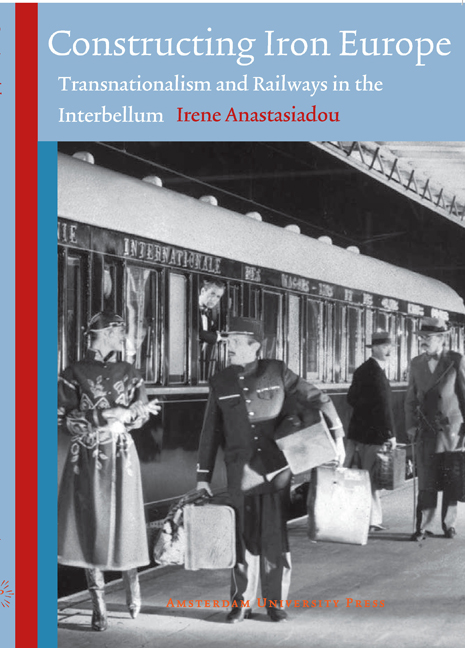Book contents
- Frontmatter
- Acknowledgements
- Contents
- Abbreviations
- 1 Introduction
- 2 Europe in Crisis and Railway Visions
- 3 Shifting Railway Regime
- 4 European Integration, European Fragmentation
- 5 Constructing the National, Constructing the European: Greece
- 6 Uncovering Railway Europe
- Bibliography
- Summary
- Curriculum Vitae
- Appendix I Timeline of Conferences and Conventions held in the Early years After the war, Concerning Railways:
- Appendix II Schedule of International Expresses in the 1930s
- Appendix III List of Illustrations
Appendix I - Timeline of Conferences and Conventions held in the Early years After the war, Concerning Railways:
- Frontmatter
- Acknowledgements
- Contents
- Abbreviations
- 1 Introduction
- 2 Europe in Crisis and Railway Visions
- 3 Shifting Railway Regime
- 4 European Integration, European Fragmentation
- 5 Constructing the National, Constructing the European: Greece
- 6 Uncovering Railway Europe
- Bibliography
- Summary
- Curriculum Vitae
- Appendix I Timeline of Conferences and Conventions held in the Early years After the war, Concerning Railways:
- Appendix II Schedule of International Expresses in the 1930s
- Appendix III List of Illustrations
Summary
Bodies concerned with issues arising out of the Peace Treaties and with future international relations regarding communications and transit.
– 1919, Commission on the International Regime of Ports, Waterways and Railway. Aim: to draft the articles concerning ports, waterways and railways to be introduced to the Peace Treaties. Membership: fifteen members two for each of the great powers (United States of America, British Empire, France, Italy and Japan) and five elected by all the powers with special interests.
→ 1920, International Commission of Enquiry for Communications and Transit. Membership: representatives of several neutral countries in addition to representatives of most of the allied powers. Aim: to prepare draft conventions on freedom of transit, international rivers and waterways, and a draft resolution regarding an international regime for certain ports
→ 1920, February 18, Provisional Communications and Transit Committee of the League. Aim: to continue the work originally started by the Peace Conference of giving effect to Article 23 (e) of the Covenant of the League, by elaborating draft general Conventions or Recommendations of Freedom of Transit, the Right of landlocked states to a Maritime Flag, and on Waterways, Railways and Ports of International Concern, together with draft Statutes for the Permanent Communications and Transit Organization of the League
→ March 1921, 1st General Conference on Communications and Transit (League of Nations), participation of representatives of 44 states, Conventions or Recommendations were adopted on all the above subjects. Establishment of the Advisory and Technical Committee for Communications and Transit.
Reconstruction in Central Europe:
– February 1919, Communication Section of the Supreme Economic council of the allies. Membership: consisted of representatives of America, Great Britain, France, Italy and Belgium, Marshal Foch, the British Naval Section and the French Foreign Office. Aim: to secure the necessary transport for the convenience of relief foodstuffs to Central Europe, to assist the different administrations in their first crisis of reconstruction and reorganization both by the collaboration of experts and by the supply of locomotives and rolling stock and of materials purchased out of relief credits, to promote international traffic until the administrations had established direct relations. Membership: representatives of the U.S.A., Great Britain, France, Italy and Belgium to which were attached representatives of Marshal Foch, the British Naval Section and the French Foreign Office.
- Type
- Chapter
- Information
- Constructing Iron EuropeTransnationalism and Railways in the Interbellum, pp. 271 - 273Publisher: Amsterdam University PressPrint publication year: 2012



